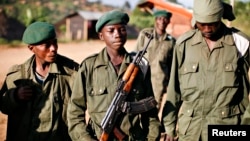The Democratic Republic of Congo’s government has launched a training program for former child combatants and victims of sexual violence.
Nearly 80 people crammed into a small village hall Friday in Nyiragongo territory in eastern Congo to witness the signing of an agreement to help young victims, and perpetrators, of recent violence rebuild their lives.
The two most important signatures on the document were those of the DRC president’s personal representative in charge of the fight against sexual violence and the recruitment of children, Jeanine Mabunda, and that of the administrator of Congo’s National Institute for Professional Training, Maurice Tshikuyi.
Speaking through a translator, Tshikuyi said he and his Institute for Professional Training colleagues came to the meeting from Kinshasa because they wanted the agreement to be witnessed by local people.
“Do you want me to sign this document?” he asked, to a chorus of approval.
Making payments
Under the agreement, the government will pay the Institute for Professional Training $25,000 to give two months of skills training to 75 people, mostly young former combatants or victims of sexual violence.
Officially, Mabunda’s office has a mandate to work for the reintegration of former child soldiers into civilian life. In a sense that mission is largely accomplished, as the Congolese army demobilized its own under-age fighters years ago.
Mabunda told reporters that her office and the U.N. Children's Fund found there was not a single child soldier at any DRC army camp that they visited.
There are still many under age combatants and former combatants from eastern Congo’s armed groups, however, and sexual violence is still a major problem, although its scale should not be exaggerated, said Mabunda. She cited statistics indicating sexual violence cases reported in eastern DRC fell by 33 percent between 2013 and last year, from about 15,000 to about 10,000.
The U.N. reports the Congolese security forces’ involvement in sexual violence has fallen sharply.
The 75 youngsters to be enrolled for training are likely just a first wave, said Mabunda.
This training for Nyiragongo is a pilot program, she said, and it should be repeated in other territories of North Kivu and in other provinces.
Thomas Ngumijimana, one of the ex-combatants who wants to enroll on an INPP course, said most of them want training in agriculture, livestock rearing or carpentry, because that is what most people do around here.
Ngumijimana said that after some training he could make $150 with agriculture over three months.
Learning skills
The young women said they hoped to enroll on courses in dressmaking, pastry making and soap making.
The Institute for Professional Training already has partnerships with the French Development Agency and other donors and is a trusted provider of training.
The government’s pledge to spend $25,000 on these training courses comes two days after the head of the United Nations Mission in Congo, Martin Kobler, raised questions about the government’s commitment to reintegrating former combatants.
Kobler said the official program for reintegrating former combatants has not yet started, although MONUSCO has allocated $6 million to a World Bank trust fund for the process. Donors have been reluctant to contribute to the fund because the government’s contribution is not clear, he said.
But he added the new DRC defense minister is very active in trying to launch the program.




